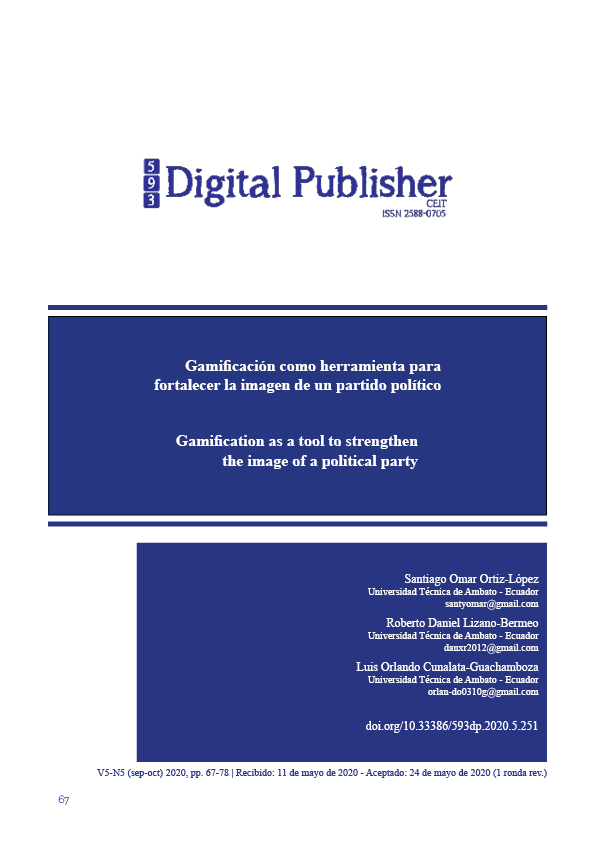Gamification as a tool to strengthen the image of a political party
Main Article Content
Abstract
This study aims to propose a methodological process of gamification to consolidate the image of a political candidate; since there was a lack of use of technological tools to publicize the information of the movement and political candidate, its profile, skills and campaign proposals. This research is of a descriptive type of transversal type, being to describe the current perception of voters regarding the image of political candidates, as well as specific aspects of the candidates and their teamwork. In addition, it has a qualitative-quantitative approach, where a targeted survey will be applied to the number of registered voters of the city of Ambato in the Preliminary Results of the 2019 and CPCCS Sectional Elections. The results include the diagnosis through the surveys and the methodological process for gamification to consolidate the image of a political candidate with their respective steps. Therefore, it is evident that gamification is essential for the promotion and dissemination of the political candidate's own information, consolidating the political image.
Downloads
Article Details
1. Derechos de autor
Las obras que se publican en 593 Digital Publisher CEIT están sujetas a los siguientes términos:
1.1. 593 Digital Publisher CEIT, conserva los derechos patrimoniales (copyright) de las obras publicadas, favorece y permite la reutilización de las mismas bajo la licencia Licencia Creative Commons 4.0 de Reconocimiento-NoComercial-CompartirIgual 4.0, por lo cual se pueden copiar, usar, difundir, transmitir y exponer públicamente, siempre que:
1.1.a. Se cite la autoría y fuente original de su publicación (revista, editorial, URL).
1.1.b. No se usen para fines comerciales u onerosos.
1.1.c. Se mencione la existencia y especificaciones de esta licencia de uso.
References
Aparicio, A. F., Gutiérrez, F. L., González, J. L., & Isla, J. L. (2012). Analysis and application of gamification. ACM.
Barragán, J., Guerra, P., & Villalpando, P. (2015). Political Marketing in Mexico: Background and Representative Strategies. Daena: International Journal of Good Conscience, 10(1), 192-204.
Castro, M., & Argüelles, J. (2019). Social Responsibility for Community Interaction in university contexts: a theoretical approach. SCIENCIAMATRY, 5(9), 168-186. doi:https: //doi.org/10.35381/cm.v5i9.111
Deterding, S., Deterding, K., Rilla, N., E., L., & Dixon, D. (2011). Gamification: Toward a Definition. Proceedings of the CHI 2011 Workshop Gamification: Using Game Design Elements in Non-Game Contexts. ACM.
Ernst & Young Media, E. (2013). Future of television. 18.
Gerling, K., & Masuch, M. (2011). Exploring the Potential of Gamification Among Frail Elderly Persons. In Proceedings of the CHI 2011 Workshop Gamification: Using Game Design Elements in Non-Game Contexts. ACM.
Gómez-Álvarez, M. C., Gasca-Hurtado, G. P., & Hincapié, J. A. (2011). Gamificación como estrategia para la Mejora de procesos software: Un mapeo Sistemático.
Hamari, J. (2013). Transforming homo economicus into homo ludens: A field experiment on gamification in a utilitarian peer-to-peer trading service. Electronic commerce research and applications.
Huotari, K., & Hamari, J. (2012). Defining gamification: a service marketing perspective. Proceeding 16th Int. Acad.
INEC. (2017). Instituto Nacional de Estadísticas y Censos. Obtenido de http://redatam.inec.gob.ec/cgibin/RpWebEngine.exe/PortalAction?&MODE=MAIN&BASE=DIEE2017&MAIN=WebServerMain.inl
Kim, J., & Lee, W. (2015). Dynamical model for gamification of learning (DMGL). Multimed. Tools Appl, 74(19), 8483–8493.
Lee, J., & Hammer, J. (2011). Gamification in Education: What, How, Why Bother?. Academic Exchange Quarterly, 15(2), 146.
Martínez, A., Mariscal, J. V., & Ochomogo, Y. (2015). Intelligent manager of scientific knowledge based in Gamification (Gicci-Game). 13th LACCEI Annual International Conference: “Engineering Education Facing the Grand Challenges, What Are We Doing?”.
Martínez, G. (2004). Marketing Político: Campañas, Medios y Estrategias Electorales. Buenos Aires, Argentina: Editorial Ugerman.
Pintado, T., & Sánchez, J. (2013). Imagen Corporativa. Influencia en la gestión empresarial. Madrid, España: ESIC.
Tokatlián, J. (2009). La Argentina, con la identidad en duda. México: La Nación.

